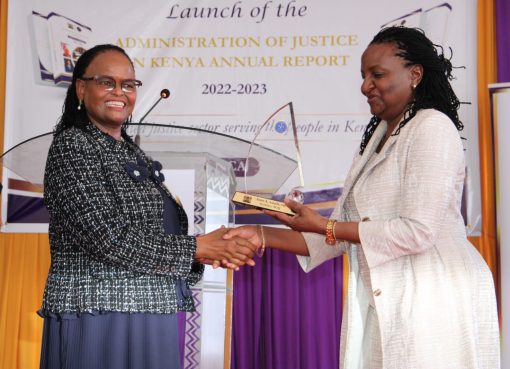Graduands from Universities and Technical Institutions in the country have been asked to utilise the skills and expertise they acquired from their learning Institutions to create employment so as to alleviate unemployment among the youth in the country.
Addressing the public when she officiated the 12th Graduation Ceremony of the Rift Valley Technical Training Institute (RVTTI) in Eldoret, Uasin Gishu, where 2034 students graduated, State Department for Technical and Vocational Education Training (TVET), Principal Secretary Esther Muoria stated that the graduands have received the requisite skills to fit in the job market.
She urged them to use the skills they have attained to positively impact the world adding that the TVET sector in Kenya has evolved over the last 40 years and has continued to produce the needed middle-level human resources for the national economy.
“The importance of TVET and its contribution towards sustainable development, realisation of Education for All (EFA) Goals, promotion of lifelong learning and addressing local and global knowledge and skills gap has been continuously underscored by the Kenya Kwanza Government,” she said.
Dr Muoria lauded the Rift Valley Technical Training Institute for having a proud history in skilling since its inception in 1962.
She added that the State Department for TVET has taken cognizant of a need to establish an internationally competitive workforce and a dire need to produce graduates who are fully skilled and ready to venture directly in employment and entrepreneurship after graduating.
The PS said that the Competency Based Education and Training (CBET) curriculum that has now been fully implemented as from September 2023, promotes a learner-centered training.
“Under CBET, trainees are encouraged to actively engage in their learning journey, taking ownership of their education. This shift not only enhances motivation, but also nurtures critical thinking, problem-solving, and self-reflection skills—the very skills that are in high demand in today’s rapidly evolving job market,” said Dr Muoria.
She further explained that one of the key features of the curriculum is dual training, whereby trainees undergo at least 50 per cent industrial training and 50 percent classwork.
Additionally, through a partnership with GIZ, a German-based development partner, the PS confirmed that the State Department is currently implementing the dual training model in 67 TVET institutions across the country.
She noted that the pilot phase of the model registered success to an extent that a high percentage of trainees placed in industries have been absorbed.
To ensure effective implementation of CBET curriculum, Dr. Muoria mentioned that the State Department for TVET in partnership with the Kenya School of TVET and other development partners, has completed the retooling of TVET trainers drawn from the initial 11 national polytechnics on CBET delivery.
She revealed that the Kenya School of TVET is currently retooling the 13 institutions that were recently elevated to national polytechnics status.
“Once the retooling of all TVET institution trainers on CBET pedagogy delivery is completed, the trainers will be upskilled in use of the contemporary equipment provided in the institutions in recent years, “said the PS.
The PS reaffirmed the government’s commitment to enhancing access to TVETs through the new higher education funding model which ensures that trainees from diverse economic backgrounds, that is, from the extremely to less needy cases, access technical training through scholarships and HELB loans.
“The model gives preference to the extremely needy in support to the Bottom-Up Economic Agenda. The Government shall also continue to support technical institutions through development of essential infrastructure as well as enhancing manpower development and deployment to sustain the accessibility and accord each Kenyan an opportunity to access technical training,” allude the PS.
Dr. Muoria pointed out that the SDTVET in partnership with the Ministry of ICT and the Digital Economy, TVETA, and Konza Technopolis, has been distributing digital labs to TVET institutions which has seen more than 23,000 youths being trained on digital skills and online jobs in various TVET institutions and are able to make good earnings from the initiative.
“In October, the highest earning record by a single individual through the Jitume Program was Sh76,600. I call upon the TVET trainees and youths in the neighboring communities where the Jitume Labs are to participate in the training as a source of employment,” she added.
She further commended the Board Members, Top Management, Trainers and Non-teaching staff of the RVTTI for diligently making use of the available resources to ensure that the right knowledge and skills were imparted to the 2034 graduands.
She called on them to uphold their core values as an institution and continue to maintain high standards.
By Ekuwam Sylvester and Judy Too




